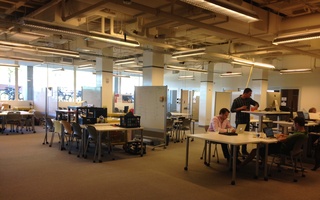{shortcode-5ae25fcab9f132c07745e88b8a699c7eb0ad2a40}
UPDATED: March 6, 2018 at 6:50 p.m.
Almost seven years after it first opened, Harvard’s Innovation Lab is looking to expand its management team to address growing interest in entrepreneurship on campus.
The i-lab is a center for innovation and entrepreneurship which opened in Nov. 2011 next to the Business School in Allston. The i-lab is open to all full-time University students. In 2012, the i-lab hosted over 55 resident teams, which have access to the lab’s space and resources.
As part of the expansion of its management team, the i-lab has created multiple openings this year for new director-level jobs, including a director of marketing and a director of operations. The center also promoted its former associate director of technology to director of programming as a part of this restructuring.
Jodi Goldstein, executive director of the i-lab, said increasing interest in entrepreneurship and innovation on campus spurred the creation of these new positions.
Goldstein said the organization is looking for people with “deep” experience in operations and management for both the marketing and operations positions.
“We’re being very selective in our hiring process,” she said. “The culture we’ve created at the i-lab is very important to us, and something where we want to make sure continues as we scale the organization.”
Goldstein compared the culture of the i-lab to that of a “well-resourced” start-up organization, adding she believes the i-lab will be able to stay “nimble” even after the expansion of its management team.
Unique to the i-lab, according to Goldstein, is its “safe and transparent” culture that allows for “experimentation and failure.”
“We believe that in order to solve these complex problems, you do need a diversity of viewpoints. So a lot of what we work on in the i-lab is what we like to call, ‘structured serendipity,’ where we bring students who otherwise may not have met, and then help them take their ideas as far as they can go,” she said.
For Goldstein, the path to addressing growing demand for innovation and entrepreneurship at the i-lab is twofold: increasing access and impact.
“Access includes serving and reaching more students, faculty, and alumni around the university, and impact is what we do when they come to us, and how we can help them reach their milestones no matter which stage of the journey they are on,” she said. “And in doing both, in scaling access and impact, it’s going to take a lot more leadership.”
Elaborating on this model, Goldstein remarked on the “unrealized value” the i-lab can provide to undergraduate students ignorant of the glass-facade center across the river.
“I’d like 100 percent of Harvard students to feel welcome and included in the i-lab ecosystem,” Goldstein said.
—Staff writer Truelian Lee can be reached at truelian.lee@thecrimson.com. Follow her on Twitter @truelian_lee.
—Staff writer Jacqueline P. Patel can be reached at jacqueline.patel@thecrimson.com. Follow her on Twitter @jppatel99.Read more in News
Dominguez to be Paid on LeaveRecommended Articles
-
I-lab Showcases Harvard Ventures at HUBWeek EventThe showcase was held as part of Boston HUBWeek, a series of events throughout the Greater Boston area organized jointly by Harvard, MIT, The Boston Globe, and Massachusetts General Hospital.
-
 Harvard to Construct Biotech ‘Life Lab’ in Allston
Harvard to Construct Biotech ‘Life Lab’ in Allston -
 Maria Thomas Opens New i-Lab Speaker Series
Maria Thomas Opens New i-Lab Speaker Series -
 First 11 Biotech Startups Admitted to Harvard’s Life Lab
First 11 Biotech Startups Admitted to Harvard’s Life Lab -
 i-lab Launches New Alumni-Led Ventures Program
i-lab Launches New Alumni-Led Ventures Program













